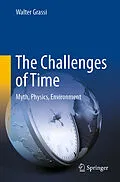This book represents a journey through the history of science in regards to the concept of time, specifically, the question as to whether it is absolute, relative, or irreversible.
The best-known contribution, or at least the most popular one, came from Einstein. He took the illusion that time was universal, a concept dating back, essentially, to Galileo and Newton, and shattered it, both within and without the scientific community.
Thermodynamics teaches us that time has a preferential direction, i.e., forward, and is irreversible, as shown by Prigogine and his theories on dissipative structures and complex systems. Time is not only an "external spectator" to what happens, but assiduously takes part in making it happen.
The concept of thermodynamics shows us how time is linked with environmental issues, as creator and destroyer. The author explores the relationships of cause and effect and how it can help in measuring the various eras of the planet, as well as understanding the beings that inhabit it.This book will be a valuable read for students, researchers, and interested laypersons alike.
Autorentext
After spending a research period at the University of Houston, TX, USA, Prof. Grassi has been involved in experimental and theoretical studies in thermo-fluid-dynamics. As part of this activity, he has engaged in several experimental campaigns in microgravity on parabolic flights, sounding rockets, and satellites funded by the ESA (European Space Agency). He has also been a member of the Physical Science Working Group and chair of a Topical Team of the European Space Agency (ESA).
Prof. Grassi has also performed a broad number of activities on Energy Saving and Management in collaboration with the ENEA (Italian Department of Energy) and has been responsible for several energy contracts. In this context, he has been the president of the Regional Energy Agency (no longer extant) of Tuscany and of the Italian Union of Geothermics.
Inhalt
Preface
Introduction
Chapter 1-From myth to experimental science
1.1 Walking with my dog
1.2 From Chronos to Aristotle
1.3 The new experimental science
Chapter 2 - Charges, Magnets and light
2.1 Moving charges and magnetism
2.2 Electromagnetic field and Lorentz hypotheses
Chapter 3 - The time of thermodynamics
3.1 The time of classical thermodynamics (the arrow of time)
3.2 Time and dissipative structures
Chapter 4 - The time of relativity
4.1 None is faster than you
4.2 Einstein and the special relativity
4.3 Some Minkowski's geometry 4.4 Does time depend only on the observer?Chapter 5 - The time of man and the time of the earth
5.1 Gaia the living planet
5.2 A simple interaction pattern
5.3 Pandemic, a warning by Gaia5.4 Ultimately
6 Conclusions
